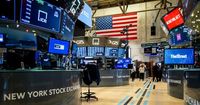U.S. consumer confidence has taken a significant hit, registering its lowest level in over a decade as inflation and economic uncertainty loom large. According to the latest report from the Conference Board, the consumer confidence index fell to 92.9 points in March, a drop of 7.2 points from the previous month. This marks the fourth consecutive month of decline, raising concerns among economists and policymakers alike.
The decline in consumer confidence is attributed to a number of factors, including rising prices and the impact of tariffs introduced by the Trump administration. While inflation has receded from its pandemic highs, it remains above the Federal Reserve's target of 2%. The sub-index measuring future expectations plummeted to 65.2 points, the lowest reading in 12 years, and well below the critical threshold of 80 that experts consider indicative of an impending recession.
Stephanie Guichard, a senior economist at the Conference Board, noted, "The optimism of consumers regarding future income, which had been relatively strong, has largely faded away." She explained that concerns about the economy and the labor market are now directly impacting consumers' perceptions of their financial situations.
The survey results reveal a greater sense of pessimism among adults aged 55 and older, but the negative sentiment extends across all income levels. Only 37.4% of respondents believe that stock prices will increase over the next year, a decrease of 10 percentage points from February. Additionally, just 16.7% expect job growth, while 28.5% anticipate fewer jobs, further reinforcing the climate of uncertainty.
Consumer confidence has also been affected by the recent downturn in the stock market, which has seen negative sentiment for the first time since late 2023. Guichard remarked that the decline in consumer views on the stock market reflects a broader anxiety about economic stability, stating, "Consumer expectations were especially grim, and confidence in the future employment outlook and short-term economic outlook fell to its lowest level in 12 years."
In light of these developments, the proportion of consumers anticipating a recession in the next year has remained stable at a nine-month high. This consistent fear of economic downturn is causing many consumers to alter their spending habits. Plans to purchase homes and cars have decreased, while intentions to buy high-cost items like appliances have increased, possibly indicating a desire to make purchases before potential price hikes due to tariffs.
The financial markets reacted to the consumer confidence report with mixed results. On March 25, the Nasdaq composite rose by 0.46% to 18,271.86 points, while the S&P 500 increased by 0.16% to 5,776.65 points. The Dow Jones Industrial Average saw a modest gain of 0.01%, closing at 42,587.50 points. Meanwhile, the Mexican Stock Exchange reported a 1.0% increase, with the S&P/BMV IPC reaching 53,203.26 points.
Despite the grim consumer sentiment, some analysts suggest that the economy remains on a solid footing. Unemployment rates continue to be low, and manufacturing activity showed signs of recovery in February. However, the persistent inflation and rising costs of borrowing are affecting household finances, making it imperative for consumers to reassess their spending strategies.
The upcoming data on inflation-adjusted spending in goods and services is expected to provide further insights into consumer behavior and economic health. As the Federal Reserve grapples with these challenges, the key question remains whether the ongoing weakness in consumer confidence will translate into observable changes in spending patterns.
In summary, the latest consumer confidence report paints a concerning picture of the U.S. economy, highlighting the impact of inflation, tariffs, and market volatility on consumer sentiment. As households navigate these challenges, the outlook for future economic growth remains uncertain, prompting calls for careful monitoring and responsive policy measures.








